The future is bright with Angus
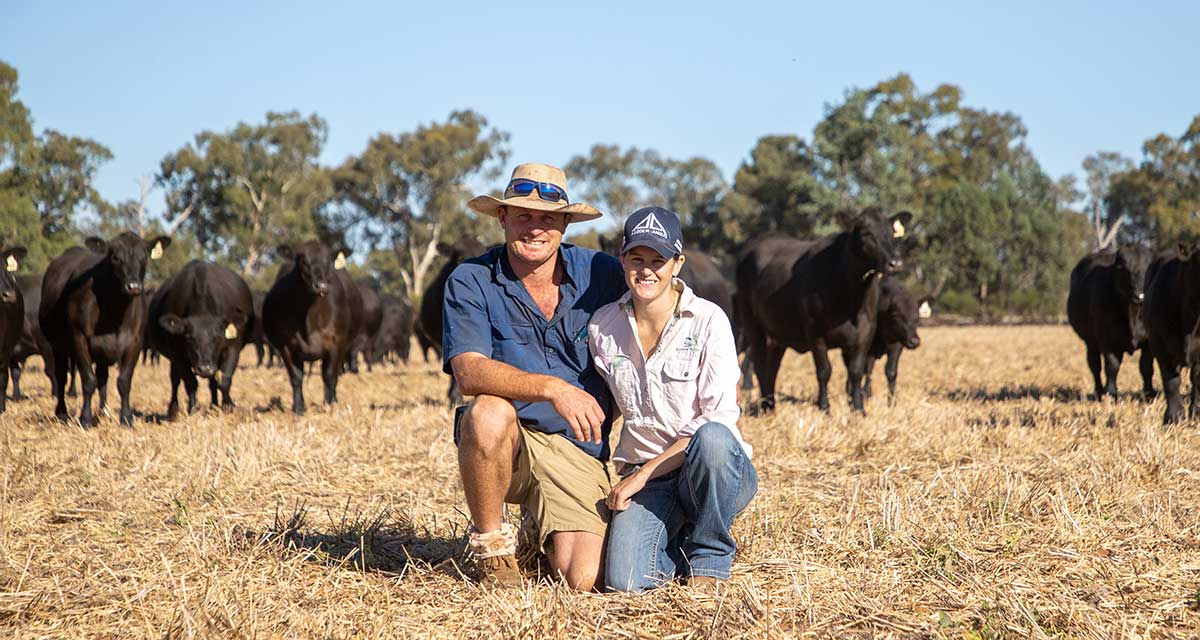

Across 3000 hectares in the Federation Shire of the Murray Region of New South Wales, Schoen Pastoral is a small family business wearing a few hats.
Run by the Schoen Family, Schoen Pastoral is centrally based in the Redlands district, and is a mixed farming enterprise of Angus cattle, crossbred sheep and cropping.
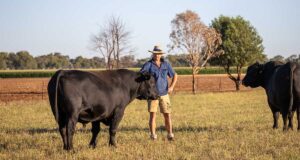 Family member Murk Schoen joins his parents and wife Kate in running the enterprise. Additionally, the business employs one seasonal casual and two full-time staff members.
Family member Murk Schoen joins his parents and wife Kate in running the enterprise. Additionally, the business employs one seasonal casual and two full-time staff members.
“I left school in Year 11 and went on to do my Diploma in Agriculture at TAFE NSW Thurgoona campus,” said Murk of his journey within the agricultural industry.
“While studying I worked throughout NSW gathering experience in various agricultural fields from stud beef cattle and commercial sheep to cropping and hay production.”
He continued, “After completing my TAFE study I moved to Wandsworth, NSW to manage a mixed grazing farm and started a farming contracting business.
“It was from here that Kate and I moved back to the southern Riverina to manage my family’s farming business. Over time we have brought our learnings and ideas to our business, including starting our Angus stud Aarden Angus in 2016.”
Across 880 hectares of their country, the family business operates their Angus seedstock operation, Aarden Angus, as well as a 200hd commercial cattle operation made of 100% Angus or Angus influenced cattle and 2000hd first cross ewe operation.
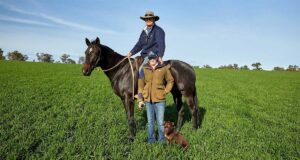 With the remaining 2200 hectares, the family sow winter crops including 100 to 200 hectares of hay production. In the summer season, the business grows 180 hectares of Adzuki beans for the Japanese and Taiwan export markets.
With the remaining 2200 hectares, the family sow winter crops including 100 to 200 hectares of hay production. In the summer season, the business grows 180 hectares of Adzuki beans for the Japanese and Taiwan export markets.
In addition, the Schoen’s also have a contract embryo calf raising business for other seedstock producers, in which they utilise their commercial herd to not only embryo transfer (ET) for their own herd, but various other seedstock herds as well.
Within their Angus operations, the family join heifers at 12 months of age over a six-week period, with an average conception rate of the lower end of 90th percentile in both their seedstock and commercial operations.
In addition to their ET program, the operation also utilises Artificial Insemination (AI) programs, with a long-term result for both sitting around mid to high 60%.
In 2024, the Schoens will be joining 90 stud females for 2024 and just shy of 200 commercial females.
“As we are in a building phase, we are culling around 10% of our stud heifers,” said Murk. “We purchase PTIC heifers to replace our commercial females.”
“When it comes to culling stock we generally start with the basics of fertility, with every female needing to calve down at 2 years old after a 6-week joining period and produce a calf every year.
“From here any females that we believe don’t carry longevity traits, like poor structure, inadequate udders and unsatisfactory temperament and finally we then remove any females that we believe have data that is not in line with progression of our breeding objectives.”
For at least two weeks prior and for 21 days post their joining period, the Schoens aim to keep nutrition as consistent as possible for their females.
“In a failed autumn like this year we are happy to put cows and calves in full containment and use a nutritionist to assist us in building a ration using products we have on hand and purchase any feed product that keeps our cost down.”
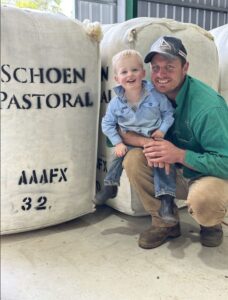 In their business, the family maintains some management philosophies when it comes to producing cattle.
In their business, the family maintains some management philosophies when it comes to producing cattle.
“We try very hard to manage condition score on our females to optimum so we can try and maximise the opportunity in front of us. We try to run our females in line with commercial practices that would replicate our clients,” said Murk.
“The balance is in bringing it all together and not getting caught up narrowing in on a single trait or an imaginary race to the top of numbers on a page. Stacked proven pedigrees, types and performance over time will produce predictability for both our herd and ultimately and most importantly our clients.”
With these philosophies in mind, the Schoens focus on what they consider fundamental longevity traits when selecting new genetics for their herd, such as feet, temperament and fertility.
“From here the traits that are most important to us are the traits that we currently get paid on in our and our bull client’s herds,” said Murk.
“For the most part this is cattle that are able to be born easily, grow quickly, and show adequate muscle expression. From here many more traits come into play in a balanced approach of bringing our herd forward.”
The herd is MSA accredited.
When it comes to bull selection for the herd, Murk said, “Consideration that we make in selecting bulls include the dam of the sire, and her production record, progeny, cow family and the herd in which she came from.
“Using sires from herds that we have identified as having values that align with ours is also important to us. Ideally, we would like to see the sire, his dam and any progeny before we use a sire.”
Across the different areas of their business, the Schoens have a number of target markets they aim their production towards.
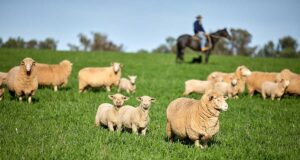 In the sheep component of the business, they aim for the supermarket sucker lamb market in early spring. Their markets for their grain production include seed expansion, commercial wheat and barley to local feedlots and grain millers. They also produce hay, straw and silage fodder for long term clients.
In the sheep component of the business, they aim for the supermarket sucker lamb market in early spring. Their markets for their grain production include seed expansion, commercial wheat and barley to local feedlots and grain millers. They also produce hay, straw and silage fodder for long term clients.
In addition to their contract embryo calf raising business, the Schoens also sell commercial weaner steers and heifers in feature summer weaner sales. In the seedstock portion of the business, they produce yearling to 18-month-old bulls selling in spring and summer, with most of their clients selling their cattle as unfinished weaner and backgrounding cattle.
“The diversity in our business really compliments each other in many ways, our highest yielding wheat crops generally are our red feed wheat that has been well grazed through winter,” said Murk.
“This allows us to take pressure off our pastures through winter when we have very little growth, as well as do any pasture cleaning.”
He continued, “We also produce large amounts of by products like barley straw which get fed back through our containment pens. Our livestock also benefit from early summer grazing of any stubbles that hold feed value.
“So overall our ability to be really intensive at certain times of the year while creating resilience through stubble grazing allows for a really positive environmental footprint.”
For the future of the business, Murk and his family are working towards producing 60 high performing bulls for their clients, produced to assist them in progressing with their breeding objectives and allowing them to have success in their chosen markets.
“I hope that the various areas of our business are leaders in their field and are providing value for customers while providing for our family and the community around us,” said Murk.
“I have always believed if you do what you enjoy then you will do it well. We have implemented this strategy through the growth of our business,” he said.
“This should always be considered around what’s suitable for your environment/area, but if you enjoy something you will put the time and effort in to succeed.
“We are also mindful that some parts of our business may only be part of the journey to the bigger picture, and I think that’s fine as long as you’re clear about this and it is aiding you to get there.”
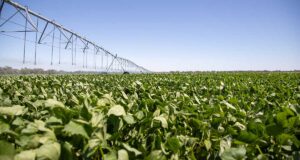 He continued, “Also in the goals for the next five years we will be finalizing our succession plan to give direction and fulfill incoming and outgoing generation’s aspirations. This will entail building some great leaders in the other areas of our business so they can implement the new technologies coming in agricultures direction while picking up the 1% improvements, all while meeting current and future market expectations.
He continued, “Also in the goals for the next five years we will be finalizing our succession plan to give direction and fulfill incoming and outgoing generation’s aspirations. This will entail building some great leaders in the other areas of our business so they can implement the new technologies coming in agricultures direction while picking up the 1% improvements, all while meeting current and future market expectations.
“I think the future for Angus cattle in Australia looks very bright and only continues to grow with opportunities in the northern cattle herd, for improvement through black cattle and to the breeds ability to be very clear with technology adoption and research,” he said.
“All of this will keep the breed in good stead in a world of increasing policies of proof of best practice.”
In 2024, Murk joined 12 other young members of the beef industry as part of the GenAngus Future Leaders Program. FIND OUT MORE
Cheyne Twist, Senior Marketing & Communications Officer